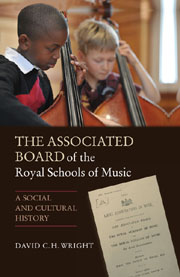Book contents
- Frontmatter
- Contents
- List of Illustrations
- List of Tables
- Dedication
- Preface
- List of Abbreviations
- Miscellaneous Conventions
- Introduction: The Context for a History
- I THE BACKGROUND
- 1 Music Exams and Victorian Society
- 2 Competing for Candidates: TCL, ABRSM and the Society of Arts
- II THE BOARD ESTABLISHED, 1889–1920
- III THE INSTITUTIONAL CULTURE, 1920–83
- IV THE BOARD REVIVED, 1983–2009
- Appendix 1 Speech and Drama Examinations
- Appendix 2 ABRSM Personalia, 1889–2010
- Select Bibliography
- Index
2 - Competing for Candidates: TCL, ABRSM and the Society of Arts
from I - THE BACKGROUND
Published online by Cambridge University Press: 05 July 2013
- Frontmatter
- Contents
- List of Illustrations
- List of Tables
- Dedication
- Preface
- List of Abbreviations
- Miscellaneous Conventions
- Introduction: The Context for a History
- I THE BACKGROUND
- 1 Music Exams and Victorian Society
- 2 Competing for Candidates: TCL, ABRSM and the Society of Arts
- II THE BOARD ESTABLISHED, 1889–1920
- III THE INSTITUTIONAL CULTURE, 1920–83
- IV THE BOARD REVIVED, 1983–2009
- Appendix 1 Speech and Drama Examinations
- Appendix 2 ABRSM Personalia, 1889–2010
- Select Bibliography
- Index
Summary
HISTORICALLY, the most significant of the grade exam boards were the ABRSM and Trinity College London, and for diplomas, the two Royal Schools and Trinity. This chapter begins with a brief outline of these institutions’ origins, their characteristics and their antagonisms, and the reasons why they began to offer extramural music exams. But the very first systematic music exams in Britain were being offered to working-class musicians by the Society of Arts, nearly twenty years before Trinity's. The Society's involvement highlights contrasting attitudes about the purpose of music exams between the mid- and the later nineteenth century. One consequence of the music exam industry later in the century was the effect of these exams in professionalizing music education, and thus on the status of music teachers themselves. The pricing and exam structures of each board reveal much about their targeting of the candidate market. The improvement in the professional and social status of music teaching became an incentive for musicians to invest in one of the expensive and challenging music diplomas that the colleges now offered. Diplomas offered a desirable certification of professional ability, and the example of the early ARCM is used as illustration. Some spheres of musical life regarded music exams as antithetical (notably the brass band world, which had its own culture and independent approach to training its instrumentalists), and this explains why grade music exams for so long catered almost exclusively for the drawing-room instrumental culture of the middle classes.
- Type
- Chapter
- Information
- The Associated Board of the Royal Schools of MusicA Social and Cultural History, pp. 42 - 60Publisher: Boydell & BrewerPrint publication year: 2013



